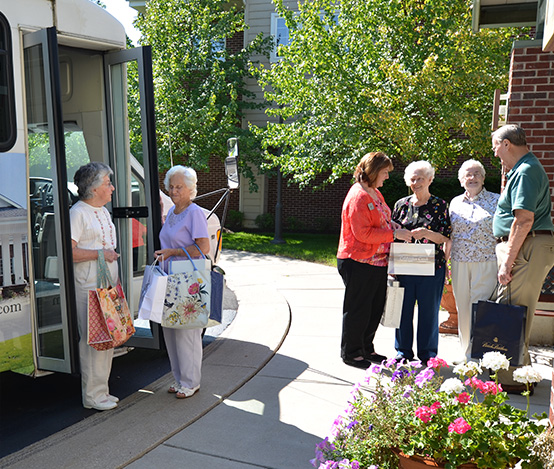I often catch myself climbing onto my soap box. The topic that pushes me to that familiar place is the idea that words matter.
I suspect those around me get tired of listening to my usual refrain that language influences beliefs and behaviors.
Sometimes I wonder if I should lighten up and just chuckle at the insensitive joke, or overlook the unfortunate word choice. But in the past few months, I’ve been reminded that I’m not alone in my thinking.
Language can Change our World
In June LeadingAge hosted a dementia think tank. Together 45 provider members and thought partners spent a day grappling with the question, “In what ways can we expand our thinking about settings (spaces and programs) for people living with dementia?”
One of the topics that came up throughout the day was the importance of language when describing dementia and the people living with it.
Participants agreed that phrases like “suffering from dementia” or “the long goodbye” devalue the people currently living with dementia. Jackie Harris, CEO of Integrace, challenged the group by saying, “my call to action is if we change our language, we change our world.”
If we’d had a soapbox big enough that day I think nearly everyone in the room would have joined me.
The Experience of Getting Old
“Language matters. When we are repeatedly assailed with negative, prejudicial words and images, we come to believe in what they stand for. When we change the language, beliefs begin to change.” -Ronni Bennett, Time Goes By, Wednesday, 25 March 2009
A few months later I had a chance to talk with Ronni Bennett. Bennett, who is 74 years old, worked in high powered media all her life. One day she woke up and realized she had unknowingly become an elder advocate through her writing.
Years earlier when Bennett was in the midst of an intense job as managing editor for a news website, she looked around and noticed she was the oldest person in the room. Completely startled by that revelation, Bennett, who was 55 years old at the time, started researching the experience of getting old.
She found constant reference to what’s often referred to as the four Ds — disease decline, dementia and death.
After amassing a lot of research on aging, Bennett started her blog, Time Goes By, as a way to organize the information and grapple with the issues of aging. Within a week she had 12 readers and 20 years later Bennett continues to explore challenging topics like incontinence and ageism.
Bennett and I sat down over warm beverages and talked for two hours. We found lots of common ground as we shared stories about work, life, ageism and language.
“Language about old people is awful,” Bennett said as we dove into the topic. To address that reality, she’s intentional about the words she uses to describe older adults on her blog. Elder, old person, old people and elders are all okay.
Senior citizen and elderly are out.
“Elderly means frail,” says Bennett, but “there’s nothing wrong with the word old in the same way there’s nothing wrong with the word young.”
Throughout our conversation, Bennett shared examples of the ways language reflects an underlying lack of respect for older adults.
Subtle examples like saying “still” when describing the lives of older adults. “She still paints,” or “he still volunteers in his community,” imply that remaining engaged throughout the lifespan is an exception. Or light heartedly calling a female older adult “young lady” as if it’s a compliment, “because we think young is good and old is bad,” said Bennett.
Examples in the aging services field are often far less subtle. Terms like “dementia patient” and “feeder,” define individuals by their disease or disability. As Bennett said, “all this language makes you feel less than what you are and it becomes a self fulfilling prophecy…it keeps being reinforced every time we use this kind of language.”
Perceptions of Aging and Longevity
Bennett reminded me of Becca Levy’s research. Dr. Levy, an associate professor of epidemiology and psychology at Yale University, explores how an elder’s interaction with his or her environment influences functioning and longevity.
In the 90’s Dr. Levy did lab experiments that included flashing words associated with aging on a screen in front of elders and asking them to perform tasks after being exposed to the subliminal messaging. Older adults who saw negative words performed worse than those who saw positive words.
Levy’s more recent research found that elders with positive self perceptions of aging lived 7.5 years longer than elders with less positive self perceptions of aging. Back to Bennett’s point about the self-fulfilling prophecy — language influences self perceptions and self perceptions influence longevity.
This is Personal
It’s natural to wonder whether this is all just political correctness, but conversations with people like Bennett and research like Dr. Levy’s reinforce the power of language, and the opportunity inherent in using language intentionally.
We’re all growing older. So improving perceptions about aging and elders has the potential to improve both the lives of those with whom we work and our own.
So next time you find yourself saying, “He’s 94 years old and still sharp as a tack,” stop to consider why that’s not a compliment. If we all make minor changes in the way we use language, we can have a big impact on our world.
Kirsten Jacobs is an education manager at LeadingAge.

